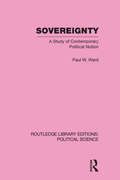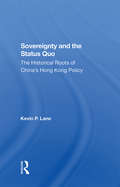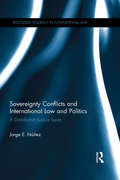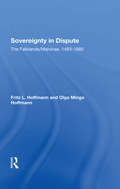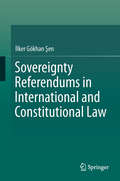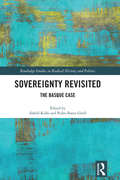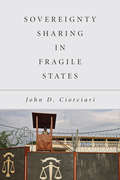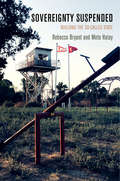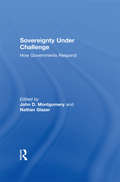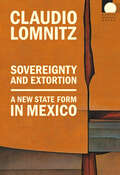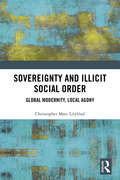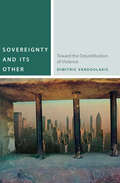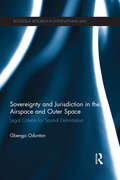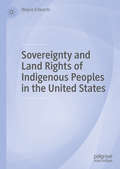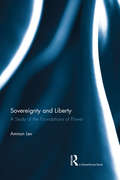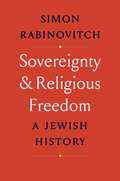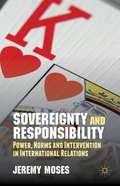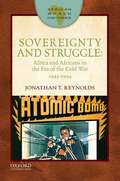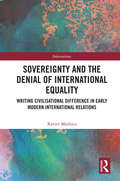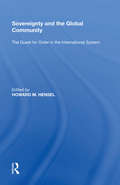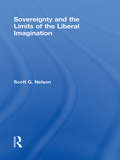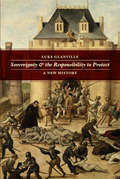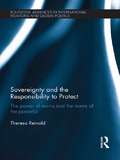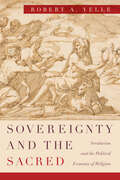- Table View
- List View
Sovereignty (Routledge Library Editions: Political Science #37)
by Paul WardThis volume analyzes the meaning of the term ‘sovereignty’ in early twentieth century thought by tracing the historical roots of the doctrine and surveying the origin of it back to feudal times.
Sovereignty And The Status Quo: The Historical Roots Of China's Hong Kong Policy
by Kevin P. LaneKevin Lane discusses the tension existed between China's traditional claim to sovereignty over Hong Kong. He believes that on historical track record China has the capacity for flexibility on Hong Kong that would enable arrangements about its future to work successfully.
Sovereignty Conflicts and International Law and Politics: A Distributive Justice Issue (Routledge Research in International Law)
by Jorge E. NúñezMany conflicts throughout the world can be characterized as sovereignty conflicts in which two states claim exclusive sovereign rights for different reasons over the same piece of land. It is increasingly clear that the available remedies have been less than successful in many of these cases, and that a peaceful and definitive solution is needed. This book proposes a fair and just way of dealing with certain sovereignty conflicts. Drawing on the work of John Rawls in A Theory of Justice, this book considers how distributive justice theories can be in tune with the concept of sovereignty and explores the possibility of a solution for sovereignty conflicts based on Rawlsian methodology. Jorge E. Núñez explores a solution of egalitarian shared sovereignty, evaluating what sorts of institutions and arrangements could, and would, best realize shared sovereignty, and how it might be applied to territory, population, government, and law.
Sovereignty In Dispute: The Falklands/malvinas, 1493-1982
by Fritz L. Hoffmann Olga M HoffmannThe Falkland (or Malvinas) Islands-a peaceful haven for land and sea birds and once a profitable paradise for whalers and seal hunters-erupted into the headlines on April 2, 1982. The armed conflict between Britain and Argentina that continued during the following two months was but one more stage in a long-standing struggle over the sovereignty of the islands, a conflict dating back to colonial times. The issues, much discussed, remain unresolved. In this book, the Hoffmanns present the background to the confrontation between Argentina and Britain, as well as an analysis of the present situation. Clarifying the importance of the seemingly insignificant, remote islands in the South Atlantic, over which European nations nearly went to war several times and which Britain wrested from Argentina in the 1830s, the authors trace the history of the dispute, the involvement of the United States, and the impact of the recent war on inter-American relations.
Sovereignty Referendums in International and Constitutional Law
by İlker Gökhan ŞenThis book focuses on sovereignty referendums, which have been used throughout different historical periods of democratization, decolonization, devolution, secession and state creation. Referendums on questions of sovereignty and self-determination have been a significant element of the international political and legal landscape since the French Revolution, and have been a central element in the resolution of territorial issues from the referendum in Avignon in 1791 until today. More recent examples include Quebec, East Timor, New Caledonia, Puerto Rico and South Sudan. The global aim of this book is to achieve a better empirical and legal understanding of sovereignty referendums and related problems in international and national law and politics. Accordingly, it presents readers a comprehensive study of sovereignty referendums from the perspectives of both international and constitutional law.
Sovereignty Revisited: The Basque Case (Routledge Studies in Radical History and Politics)
by Åshild Kolås Pedro Ibarra GüellThis book explores the new debates on Basque sovereignty and statehood that have emerged in the post-violence Basque political scenario. It deciphers how sovereignty is understood or imagined by a revitalized civil society after the unilateral cessation of operations by ETA (Basque Homeland and Freedom). The contributors to this book investigate the new political field developing in the nexus between conventional party politics, established socio-cultural and linguistic organizations, creative civil society initiatives, and innovative activism. This book is for graduate students, scholars and professionals in political science, social anthropology, European studies, political philosophy, transnational studies, sociology, political geography, and global studies. It will also be of interest to academic specialists in Basque studies, specialists working on sovereignty, nationalism and globalization, and professionals in governance, international relations, foreign affairs, European politics and diplomacy.
Sovereignty Sharing in Fragile States
by John D. CiorciariIn fragile states, domestic and international actors sometimes take the momentous step of sharing sovereign authority to provide basic public services and build the rule of law. While sovereignty sharing can help address gaps in governance, it is inherently difficult, risking redundancy, confusion over roles, and feuds between partners when their interests diverge. In Sovereignty Sharing in Fragile States, John D. Ciorciari sheds light on how and why these extraordinary joint ventures are created, designed, and implemented. Based on extensive field research in several countries and more than 150 interviews with senior figures from governments, the UN, donor states, and civil society, Ciorciari discusses when sovereignty sharing may be justified and when it is most likely to achieve its aims. The two, he argues, are closely related: perceived legitimacy and continued political and popular support are keys to success. This book examines a diverse range of sovereignty-sharing arrangements, including hybrid criminal tribunals, joint policing arrangements, and anti-corruption initiatives, in Sierra Leone, Cambodia, Lebanon, Timor-Leste, Guatemala, and Liberia. Ciorciari provides the first comparative assessment of these remarkable attempts to repair ruptures in the rule of law—the heart of a well-governed state.
Sovereignty Suspended: Building the So-Called State (The Ethnography of Political Violence)
by Rebecca Bryant Mete HatayWhat is de facto about the de facto state? In Sovereignty Suspended, this question guides Rebecca Bryant and Mete Hatay through a journey into de facto state-building, or the process of constructing an entity that looks like a state and acts like a state but that much of the world says does not or should not exist. In international law, the de facto state is one that exists in reality but remains unrecognized by other states. Nevertheless, such entities provide health care and social security, issue identity cards and passports, and interact with international aid donors. De facto states hold elections, conduct censuses, control borders, and enact fiscal policies. Indeed, most maintain representative offices in sovereign states and are able to unofficially communicate with officials. Bryant and Hatay develop the concept of the "aporetic state" to describe such entities, which project stateness and so seem real, even as nonrecognition renders them unrealizable.Sovereignty Suspended is based on more than two decades of ethnographic and archival research in one so-called aporetic state, the Turkish Republic of Northern Cyprus (TRNC). It traces the process by which the island's "north" began to emerge as a tangible, separate, if unrecognized space following violent partition in 1974. Like other de facto states, the TRNC looks and acts like a state, appearing real to observers despite international condemnations, denials of its existence, and the belief of large numbers of its citizens that it will never be a "real" state. Bryant and Hatay excavate the contradictions and paradoxes of life in an aporetic state, arguing that it is only by rethinking the concept of the de facto state as a realm of practice that we will be able to understand the longevity of such states and what it means to live in them.
Sovereignty Under Challenge: How Governments Respond
by Nathan GlazerSovereignty-the authority of a state to wield ultimate power over its territory, its citizens, its institutions-is everywhere undergoing change as states respond in various ways to the challenges posed, from above and below. "Above" the state is the widening net of international institutions and treaties dealing with human rights, trade, investment, and monetary affairs; and "below" it are rising claims within states from long-resident groups discontented with the political order and from new migrants testing its authority. Sovereignty under Challenge deals with a range of such challenges and responses, analyzed in authoritative studies by leading scholars. The introductory chapter sets forth the theme that sovereignty is asserted clearly, but often unpredictably, when governments respond to challenge. It suggests ways of classifying these responses as variables that help explain the changing nature of sovereignty. Part 1, "The Citizen and the State," treats the rising tide of dual citizenship and the concerns this arouses in the United States; the work of national human rights commissions in Asia; and the challenge posed to the state by the Falungong movement in China. The two chapters in Part 2, "The Government as Decision-Maker," examine Japan's response to global warming and the problems of the World Health Organization in orchestrating collaboration among Southeast Asian states in implementing infectious disease control. Part 3, "Sovereignty and Culture," looks at conflicts engendered by outside change on indigenous economic, cultural, and legal institutions in India, Fiji, Indonesia, and Malaysia. The chapters in Part 4, "Sovereignty and the Economy," analyze the economic and cultural instability induced by Chinese migration to Russia's far east; the impact on state sovereignty brought about by transnational regulatory campaigns and social activism; the question of indigenous land rights in the Philippines; and the impact of transnational corporations on information technology in Asia. A concluding chapter offers a global assessment of the current status of state sovereignty.
Sovereignty and Extortion: A New State Form in Mexico (Public Planet Books)
by Claudio LomnitzOver the past fifteen years in Mexico, more than 450,000 people have been murdered and 110,000 more have been disappeared. In Sovereignty and Extortion, Claudio Lomnitz examines the Mexican state in relation to this extreme violence, uncovering a reality that challenges the familiar narratives of “a war on drugs” or a “failed state.” Tracing how neoliberal reforms, free trade agreements, and a burgeoning drug economy have shaped Mexico’s sociopolitical landscape, Lomnitz shows that the current crisis does not represent a tear in the social fabric. Rather, it reveals a fundamental shift in the relationship between the state and the economy in which traditional systems of policing, governance, and the rule of law have eroded. Lomnitz finds that power is now concentrated in the presidency and enforced through militarization, which has left the state estranged from itself and incapable of administering justice or regaining control over violence. Through this critical examination, Lomnitz offers a new theory of the state, its forms of sovereignty, and its shifting relation to capital and militarization.
Sovereignty and Illicit Social Order (Global Governance)
by Christopher Marc LilybladContesting conventional assumptions of the modern nation-state, this book challenges us to rethink the segmentation of the political realm and its underlying economic and social processes. Cognizant of the historical context of systemic change, Lilyblad reconstructs how illicit social order arises from agonistic competition over territory, authority, and institutions. Immersive empirical investigation traces this bottom-up process in local conflict zones, detailing how spontaneous configurations of violence, socioeconomic resources, and legitimacy transcend the divide between public and private. Ultimately, the analytical vantage of global governance assesses the sobering implications for sovereignty to more accurately reflect the world we have, not the one we may want. By showing how these inherently local illicit social orders develop apart from – not below – the state within a global anarchic society, this book will be of interest to a wide range of scholars, including political scientists, economists, sociologists, geographers, as well as researchers in interdisciplinary fields such as International Development, International Political Economy, and Global Governance.
Sovereignty and Its Other: Toward the Dejustification of Violence (Commonalities)
by Dimitris VardoulakisIn this new book, Dimitris Vardoulakis asks how it is possible to think of a politics that is not commensurate with sovereignty. For such a politics, he argues, sovereignty is defined not in terms of the exception but as the different ways in which violence is justified. Vardoulakis shows how it is possible to deconstruct the various justifications of violence. Such dejustifications can take place only by presupposing an other to sovereignty, which Vardoulakis identifies with radical democracy. In doing so, Sovereignty and Its Other puts forward both a novel critique of sovereignty and an original philosophical theory of democratic practice.
Sovereignty and Jurisdiction in Airspace and Outer Space: Legal Criteria for Spatial Delimitation (Routledge Research in International Law)
by Gbenga OduntanSovereignty and jurisdiction are legal doctrines of a complex nature, which have been subject to differing interpretations by scholars in legal literature. The tridimensionality of state territory recognised under customary international law subsists until the present but there are other territories that do not or cannot belong to any state or political entity which also must be accounted for in legal theory. The issues surrounding sovereignty and jurisdiction are likely to become ever more pressing as globalisation, growing pressure on resources and the need for energy and national security become acute, and the resolution of special delimitation disputes seems likely to become a vital question in the twenty-first century. As a result of the fast pace of technological developments in air and space activities and the massive increases in air transportation , satellite communications and space exploration, the need for scholars and practitioners to sharpen their appreciation of the legal and political issues becomes crucial. This book will focus primarily on the issues of sovereignty jurisdiction and control in airspace and outer space and their effects on public and private activities, but it will also look at related issues pertaining to the Seas and Antarctica. Commercial exploitation, resource control and the international regime regulating contractual obligations in relation to transportation of goods and services over all forms of territory will be examined to the extent that they are necessary to explain jurisdictional rights and duties over territory. Older problems of international law such as crimes in the air and airspace trespass are treated along with newer developments such as space tourism as well as growing demand for private ownership and involvement in outer space exploitation. The book goes on to consider the distinction between airspace and outer space and puts forward legal criteria which would allow for the resolution of the spatial delimitation dispute. These criteria would determine where in spatial terms the exclusive sovereignty of airspace ends and where outer space – the province of all mankind – begins, and contribute to the jurisprudence of territorial sovereignty and jurisdiction.
Sovereignty and Land Rights of Indigenous Peoples in the United States
by Wayne EdwardsThis book presents a comparative study of the land settlements and sovereign arrangements between the US government and the three major aggregated groups of indigenous peoples—American Indians, Native Alaskans, and Native Hawaiians—whose land rights claims have resulted in very different outcomes. It shows that the outcomes of their sovereign claims were different, though their bases were similar. While the US government insists that it is committed to the government-to-government relationship it has with the tribes, federal authority severely limits the ability of tribal governments to participate as an equal partner.
Sovereignty and Liberty: A Study of the Foundations of Power
by Amnon LevThe attitude we take to power is almost invariably one of distrust, never more so than when it claims to be sovereign. And yet, we have always been drawn to sovereignty. Out of fear or fascination, we accepted that it was a condition of our liberty; that to assert ourselves as free, we would have to work not against but through sovereign power. This book retraces the history of the implication of sovereignty and liberty, an implication that has shaped the way we live together, as individuals and as political beings. Shedding new light on the work of key political and constitutional thinkers, including Marsilius of Padua, Hobbes, Hegel, Kelsen, and Schmitt, it identifies the conceptual operations that created sovereignty and shows how subjection to an absolute and undivided power came to be a source of meaning. At the heart of the analysis is the idea that sovereignty made reference to and relied upon a form of faith which aligned man’s political existence on law. Offering new and often controversial insights into the grounds of our attachment to sovereign power and into the crisis that is currently affecting its institutions, this book will appeal to students and scholars of law, politics, history of philosophy, and the social sciences.
Sovereignty and Religious Freedom: A Jewish History
by Simon RabinovitchA comparative legal history of Jewish sovereignty and religious freedom, illuminating the surprising ways that collective and individual rights have evolved over the past two centuries It is a common assumption that in Israel, Jews have sovereignty, and in most other places where Jews live today, they have religious freedom instead. As Simon Rabinovitch shows in this original work, the situation is much more complicated. Jews today possess different kinds of legal rights in states around the world; some stem from religious freedom protections, and others evolved from a longer history of Jewish autonomy. By comparing conflicts between Jewish collective and individual rights in courts and laws across the globe, from the French Revolution to today, this book provides a nuanced legal history of Jewish sovereignty and religious freedom. Rabinovitch weaves key themes in Jewish legal history with the individual stories of litigants, exploring ideas about citizenship and belonging; who is a Jew; what makes a Jewish family; and how to define Jewish space. He uses recent court cases to explore problems of conflicting rights, and then situates each case in a wider historical context. This unique comparative history creates a global picture of modern legal development in which Jews continue to use the law to carve out surprising forms of sovereignty.
Sovereignty and Responsibility
by Jeremy MosesFor the past two decades, arguments in favour of the use of force for humanitarian purposes have rested heavily upon the concept of 'sovereignty as responsibility'. Yet the many complex challenges posed by crises in places such as Kosovo, Libya, Syria and Ukraine have illustrated the continuing failure of such normative arguments to transform the practice of international relations. This book responds to these theoretical and practical problems by drawing a sharp distinction between two strands of thought on the concept of sovereignty, one focused on power and the other on moral and legal responsibilities. Through analysis of case studies of Kosovo and Libya and consideration of the concept of the world state, the weaknesses and dangers of normative claims in support of humanitarian intervention are exposed and analysed.
Sovereignty and Struggle: Africa and Africans in the Era of the Cold War 1945-1994 (African World Histories)
by Jonathan T. ReynoldsThe first three chapters of Sovereignty and Struggle offer a thematic approach, covering the politics of early liberation struggles, economics, and global Cold War complexities. They provide students with insight into the motivations and aspirations of Africans from around the continent during theCold War period. The last two chapters focus on pop culture - music, nation building, and identity - and specifically on popular representations of mobility, modernity, and sovereignty in Ghana during the 1950s and 1960s.
Sovereignty and Territorial Temptation
by Rossi Christopher R.This powerful book stands on its head the most venerated tradition in international law and discusses the challenges of scarcity, sovereignty, and territorial temptation. Newly emergent resources, accessible through global climate change, discovery, or technological advancement, highlight time-tested problems of sovereignty and challenge liberal internationalism's promise of beneficial or shared solutions. From the High Arctic to the hyper-arid reaches of the Atacama Desert, from the South China Sea to the history of the law of the sea, from doctrinal and scholarly treatments to institutional forms of global governance, the historically recurring problem of territorial temptation in the ageless age of scarcity calls into question the future of the global commons, and illuminates the tendency among states to share resources, but only when necessary.
Sovereignty and the Denial of International Equality: Writing Civilisational Difference in Early Modern International Relations (Interventions)
by Xavier MathieuThis book asks whether sovereignty can guarantee international equality by exploring the discourses of sovereignty and their reliance on the notions of civilisation and savagery in two historical colonial encounters: the French explorations of Canada in the 16th century and the domestic troubles linked to the Wars of Religion. Presenting the concept of ‘civilised sovereignty’, Mathieu reveals the interplay between the domestic and external claims to sovereignty, and offers a dynamic analysis of the theory and practice of the concept. Based on extensive archival research, this book provides an in-depth intellectual picture of the theory and practice of sovereignty in early modern France by focusing on the discourses deployed by French political theorists. Mathieu applies performativity in order to denaturalise these discourses of statehood and reveals how the domestic and international constructions of sovereignty feed into one another and equally rely on appeals to civilisation and savagery. Overall, the book questions the ‘myth of sovereignty as equality’ and reflects on the persistence of this association despite the overwhelming empirical evidence that it institutes international hierarchies and inequalities. Representing a major intervention in the existing IR debates about sovereignty, this book will be a valuable resource for researchers working on issues of sovereignty and equality in IR.
Sovereignty and the Global Community: The Quest for Order in the International System (Global Interdisciplinary Studies)
by Howard M. HenselInternational normative standards constitute a major influence on the policies of states and other actors in the international system, as well as on the development of the international system itself. This case study-rich volume demonstrates the relevance of international normative ideals and standards, outlining some of the major opportunities for, and the challenges affecting, co-operation among members of the international community. Contemporary problems such as weapons of mass destruction, refugees and internally displaced persons, ethnic conflict, and the environment are all explored in this timely volume. Sovereignty and the Global Community will prove an excellent resource for all interested in issues of sovereignty, sustainable development, resource management and the peaceful resolution of conflicts.
Sovereignty and the Limits of the Liberal Imagination
by Scott G NelsonThis volume examines and critiques several of the classical theoretical foundations of domestic and international organization, concentrating on the contestable conceptions of community, order, justice, freedom, responsibility and wealth developed by the major political theorists of the modern epoch. Nelson argues that the accepted discourses of world politics are constructed by way of particular interpretive negotiations of what sovereign power is and what it must be made to accomplish in domestic and world politics. Providing a Foucaultian analysis of modern power and the liberal subject, the work traces the history of modern inquiries into sovereignty to a time when the state was being severed from a Christian eschatology, a time when political theorists sought ways of lending meaning and purpose to emerging conceptions of ‘the political.’ Modern theories of sovereignty, Nelson argues, embody the remainders of a deep worry over the precarious nature of legitimacy, the contingency of power, and the frailty of any political form. The theoretical traditions of liberalism and the Enlightenment dispense with anxiety over the politics of legitimacy by repressing the historical, constricting the political, and fashioning political rationalities suited to increasingly intimate and ever-expansive forms of liberal governance. This book aims to explore how modern theories of sovereignty elicit and effect governable subjects and forms of political community that have proven crucial to intensifying and expansive powers of the liberal state. An inquiry into modern theories of sovereignty and statecraft and a critical interrogation of how political theories are invoked by the traditions of international relations across the modern era, this volume will be of interest to all scholars of political theory, political philosophy and international relations.
Sovereignty and the Responsibility to Protect: A New History
by Luke GlanvilleIn 2011, the United Nations Security Council adopted Resolution 1973, authorizing its member states to take measures to protect Libyan civilians from Muammar Gadhafi's forces. In invoking the "responsibility to protect," the resolution draws on the principle that sovereign states are responsible and accountable to the international community for the protection of their populations and that the international community can act to protect populations when national authorities fail to do so. The idea that sovereignty includes the responsibility to protect is often seen as a departure from the classic definition, but it actually has deep historical roots. In Sovereignty and the Responsibility to Protect, Luke Glanville argues that this responsibility extends back to the sixteenth and seventeenth centuries, and that states have since been accountable for this responsibility to God, the people, and the international community. Over time, the right to national self-governance came to take priority over the protection of individual liberties, but the noninterventionist understanding of sovereignty was only firmly established in the twentieth century, and it remained for only a few decades before it was challenged by renewed claims that sovereigns are responsible for protection. Glanville traces the relationship between sovereignty and responsibility from the early modern period to the present day, and offers a new history with profound implications for the present.
Sovereignty and the Responsibility to Protect: The Power of Norms and the Norms of the Powerful (Routledge Advances in International Relations and Global Politics)
by Theresa ReinoldThis book explores how the bedrock institution of today’s global order – sovereignty – is undergoing transformation as a result of complex interactions between power and norms, between politics and international law. This book analyses a series of controversial military interventions into the internal affairs of "irresponsible sovereigns" and discusses their consequences for the rules on the use of force and the principle of sovereign equality. Featuring case studies on Kosovo, Darfur and Afghanistan, It shows that frames from one discourse (for example the debate over the responsibility to protect) have been imported into other discourses (on counter-terrorism and nuclear non-proliferation) in an attempt to legitimize a bold challenge to the global legal order. Although the ‘demise’ of sovereignty is widely debated, this book instead seeks to ‘deconstruct’ sovereignty by explaining how this institution has been reconstituted by global powers whose hegemonic law-making activities have popularized the notion of sovereignty as responsibility. Drawing on international relations theory, international law and sociology, Sovereignty and the Responsibility to Protect develops a truly interdisciplinary perspective on the transformation of sovereignty and will be of strong interest to students and scholars in these fields.
Sovereignty and the Sacred: Secularism and the Political Economy of Religion
by Robert A. YelleSovereignty and the Sacred challenges contemporary models of polity and economy through a two-step engagement with the history of religions. Beginning with the recognition of the convergence in the history of European political theology between the sacred and the sovereign as creating “states of exception”—that is, moments of rupture in the normative order that, by transcending this order, are capable of re-founding or remaking it—Robert A. Yelle identifies our secular, capitalist system as an attempt to exclude such moments by subordinating them to the calculability of laws and markets. The second step marshals evidence from history and anthropology that helps us to recognize the contribution of such states of exception to ethical life, as a means of release from the legal or economic order. Yelle draws on evidence from the Hebrew Bible to English deism, and from the Aztecs to ancient India, to develop a theory of polity that finds a place and a purpose for those aspects of religion that are often marginalized and dismissed as irrational by Enlightenment liberalism and utilitarianism. Developing this close analogy between two elemental domains of society, Sovereignty and the Sacred offers a new theory of religion while suggesting alternative ways of organizing our political and economic life. By rethinking the transcendent foundations and liberating potential of both religion and politics, Yelle points to more hopeful and ethical modes of collective life based on egalitarianism and popular sovereignty. Deliberately countering the narrowness of currently dominant economic, political, and legal theories, he demonstrates the potential of a revived history of religions to contribute to a rethinking of the foundations of our political and social order.
